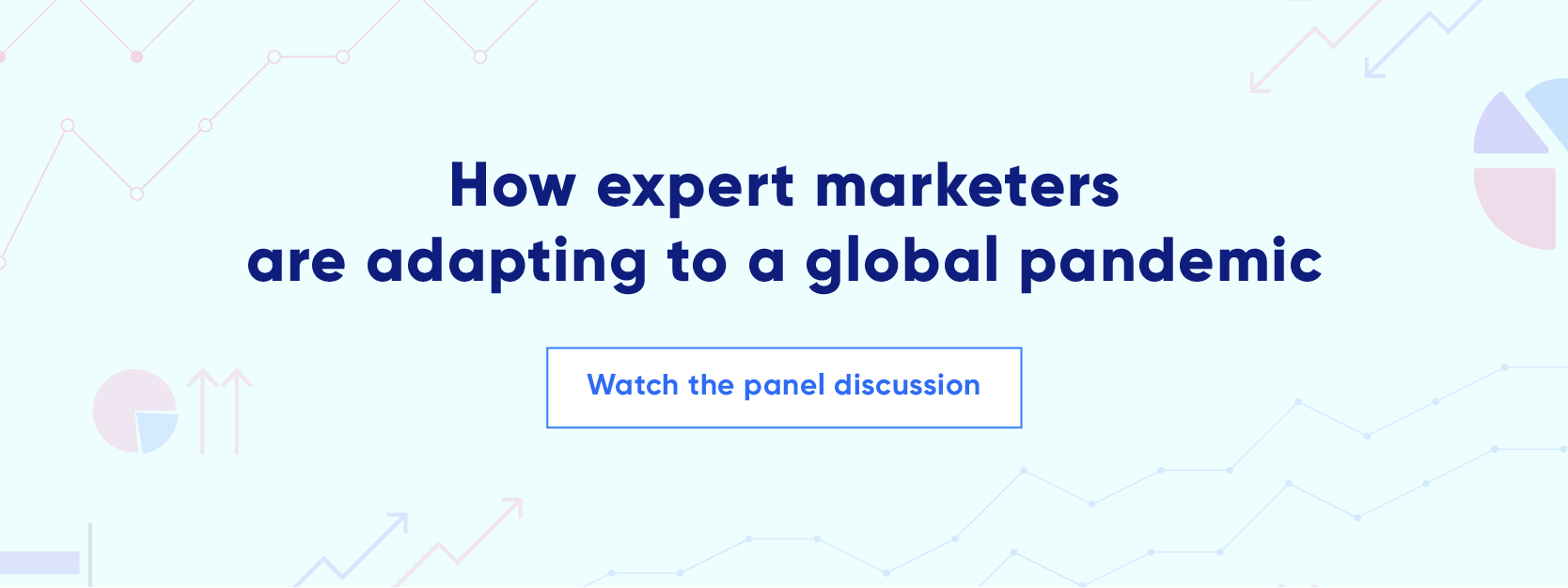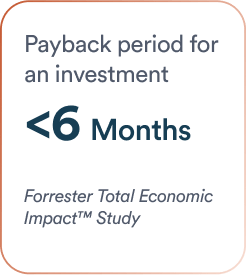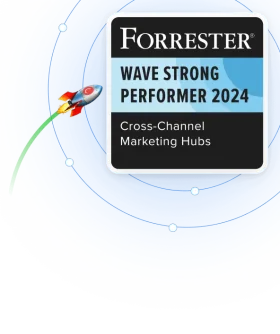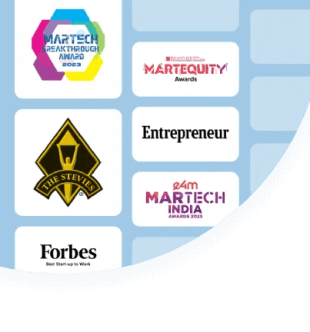“May you live in interesting times.”
This purported curse feels especially apt in 2020: a global pandemic, economic upheaval, and significant social and political shifts have left many of us wondering what’s next.
Marketers in particular are in a strange state of flux as more countries emerge from lockdown and attempt to reestablish a new normal. How do marketers need to adjust their strategies in order to be successful over the coming months? How can brands understand and deliver what customers need when those needs are constantly changing?
We spoke with marketing executives at over 30 major brands, including Coca-Cola, Airbnb, Reddit, Vonage, and Amazon Web Services, and we’re sharing their best tips and insights here.
The Role of Marketing

With so many seismic shifts happening in society, it can be difficult for brands to navigate their roles and understand what customers expect from them. And given the gravity of the crises many are facing, sitting down to create a blog post, tweet, or push campaign can sometimes feel frivolous or out of touch.
But as our panelists remind us, the work marketers do continues to have special significance and an important role in shaping our future — both economically and socially.
“The economy is critical — it’s how people put food on the table, it’s how rent gets paid, it’s how people clothe themselves. Marketers are on the front line of the economy, and the work you do matters.”
— Forbes journalist and moderator John Koetsier
“This isn’t new: over the last several years we’ve seen a trend of people wanting to collaborate and connect virtually. This pandemic is accelerating that. User feedback is that we’re bringing positivity to their lives.”
— Eugenia Kovalenko, VP of Growth at Smule
“It’s not just about predicting the post-COVID future. Brands have the opportunity to influence consumers’ minds and hearts. Marketers can help create that positive future we all want to see.”
— Rodolfo Echeverria, Global Head of Creative at Coca-Cola
The Importance of Agility

If there’s one thing the first half of 2020 has proven, it’s that everything can change on a dime. What was front-page news a week ago is now old hat — and this breakneck pace of change shows no signs of slowing.
Your customers’ contexts are shifting faster than ever before, and with them their needs and expectations for your brand. In order to survive and succeed, marketing teams must be responsive and embrace an agile work methodology.
[bctt tweet=”Your main competition isn’t against your direct competitors, it’s against who you were yesterday. How quickly can you adapt?” username=”gregstuart, Global CEO @MMAglobal #NewMarketingRules”]
“This is not the time for your brand to go silent or do communications as usual. You have to shift to understand your customers’ mindset and reallocate marketing budget to be where they are: streaming media, social media, etc. We’re moving at whiplash speed where every day feels like a new era. Brands have to stay one step ahead and anticipate where customers need us — both in the immediate crisis and in the long-term.”
— Juliet D’Ambrosio, Senior Director of Strategy at Adrenaline
“In order to keep users engaged, you need a flexible team that can respond to rapid-fire changes while focusing on customer needs.”
— Jana Jacobs, Director of Product Marketing at Credit Sesame
“Challenge the way you’re doing things. We needed to adjust our ad strategy, our segmentation, how we do paid user acquisition. All of this will make us stronger as business leaders coming out of this.”
— Eugenia Kovalenko, VP of Growth at Smule
The Increasing Value of Customer Data

Understanding and fulfilling customer needs starts with real-time data. Successful strategies aren’t built on guesswork and intuition, and that’s never been truer than right now.
Nearly every expert panelist in our live chat series emphasized the importance of data-driven marketing — and they revealed that staying close to data not only uncovered valuable insights into their customer experience, but led to an important shift in their marketing strategies or product roadmap.
“With so much up in the air right now, our instinct as marketers has never been less equipped to help us make strategy decisions. So double down on customer data. For us, it’s illustrating some very strong signals from our users. They’re gravitating towards different features. The ability to pivot successfully depends on being as close as possible to that data.”
—Rebecca Nackson, Founder at Notable
“You’ve got to make decisions based on the numbers. How much revenue are you generating and how quickly is that user cohort breaking even on your customer acquisition cost? Find out where you can optimize risk vs. reward.”
— Sai Srinivas Kiran, Co-Founder & CEO at Mobile Premier League
[bctt tweet=”“Own your data. We’ve learned so many new things about how our customers behave, which we’ve used to roll out new, more effective strategies.”” username=Michael Wicke, VP International Marketing @deliveryherocom]
The New Keys to User Engagement

What are your customers looking for in times of crisis? What will they need in the post-COVID world? No matter what vertical you’re in, there’s one thing every marketer can agree on: what worked to engage customers in 2019 doesn’t work any longer.
Humanity and personal connections are more important than ever. Brands who can personalize every interaction with a user create a tremendous advantage for themselves when it comes to attracting and keeping customers in the months and years to come.
“We have to meet users where they need us. We have to adjust our product and our messaging to make sure that we don’t appear tone-deaf. Marketers have to be conscious, empathetic, and thoughtful.”
— Jana Jacobs, Director of Product Marketing at Credit Sesame
[bctt tweet=”“You’ve got to treat people as individuals. If you want to drive engagement you must appeal to the person first and to the consumer or professional second.”” username=”suniltom, CEO & Co-Founder @clevertap #NewMarketingRules”]
“Community is key. On our Facebook groups, engagement is up 35% since the start of April. We’re having more conversations than ever, and it’s yielding valuable insights into how we can meet changing customer needs.”
— George Sullivan, CEO & Founder at The Sole Supplier
“What we’re seeing is an acceleration of trends that already existed. From a marketing perspective, relevance has never been more important.”
– Adam Hadi, VP of Marketing at Current
“We’ve really tried to use the words ‘we’ and ‘us’ in our customer communications. We want our customers to know we’re solving problems together.”
— David Llewellyn, Marketing Director, EMEA at AppsFlyer
The Significance of Customer Retention

Building a resilient business simply isn’t possible without prioritizing customer retention. That’s especially true now. Whether your vertical is one of the lucky few seeing a surge in demand or one that’s struggled to attract customers in lockdown, the #1 priority for every marketing executive we spoke with was to keep their mobile customers coming back.
How? By building authentic relationships and delivering consistent value.
“Building trust and long-lasting relationships is more critical than ever. If you build those long-term relationships today, those people will stick with you as we all weather the storm. You have to think about pivoting your business model from acquisition to customer retention.”
— Jana Jacobs, Director of Product Marketing at Credit Sesame
“As we’re seeing such tremendous growth, we’re asking ourselves: how do we make sure these users want to stick around? If we can show value within the first week, that’s the most significant thing.”
— Catharine Burhenne, Head of Marketing at ReelGood
“Retention depends on meeting customer needs in the moment. We’re talking to from our audience more than ever, and helpful content is what’s resonating right now. For example, we’ve seen a 280% increase in traffic from Google for size guides.”
— George Sullivan, CEO & Founder at The Sole Supplier
[bctt tweet=”“Showcase your humanity. Send love. Never miss an opportunity to remind people that there are humans behind your brand.”” username=”Rebecca Nackson, Founder at Notable via @CleverTap #NewMarketingRules”]
The Future of Marketing

We’re all living through history together — a remarkable flashpoint where our global society and economy are being transformed. No one knows how long-lasting the impact will be, or how far the ripple effect will extend. So what’s next for the marketing industry? Our experts had a refreshingly optimistic take on what lies ahead.
“We’re actually seeing a move away from consumerism, and people want to live more sustainably. Technology for good can be really powerful and it’s going to be a massive theme going forward.”
— Hermione Way, CMO at SPORTSIDE
“People are best off treating this like a windfall. It’s a fool’s errand to base a strategy on this. Brands should take advantage of all these new users, but I wouldn’t take it as a given. Focus on efficiency.”
— Grant Harbin at Headlight
“Plan for multiple scenarios based on economic trends and consumer behavior. Look at the micro-trends in your sector so you’re ready for stretch and conservative scenarios. Also look into potential partnerships: a lot of companies are looking for ways to enhance their business, so there are a lot of rich collaboration opportunities.”
— Eugenia Kovalenko, VP of Growth at Smule
“Double down on what makes your product great. The needs your products fill don’t go away with COVID, but they may shift. Have conversations with your product teams — focus on those moments of delight within your product.”
— Catharine Burhenne, Head of Marketing at ReelGood
“Create flexibility within a framework. For example, customizing communications by geography and consumer mindset will be key, but you also have to create something scalable. Brands need to invest in digital infrastructure.”
— Juliet D’Ambrosio, Senior Director of Strategy at Adrenaline
“Customer segmentation must be a priority. Who are your best customers? How much do they contribute to your bottom line? You must focus on your most valuable customers.”
— Meera Iyer, CMO at Medlife
“What’s not changing? Storytelling, consumer insights, personalized experiences: the fundamentals of marketing will remain. Humans will continue to look for love, discovery, connection, and purpose.”
— Rodolfo Echeverria, Global Head of Creative at Coca-Cola
“Brands that are willing to adapt and transform — stand on those marketing foundations and allow the tides of history to mold them — are the brands that are going to be successful.”
—Will Cady, Head of Brand Strategy at Reddit
“The whole customer lifecycle is changing and we’re arriving at a new era of customer experience. Beyond personalization is individualization: how do you create true 1:1 engagement?”
— Lisette Huyskamp, VP Marketing EU at CleverTap
[bctt tweet=”“Assume your brand needs reinvention. What’s your purpose? Why does your brand exist? The magnitude of this crisis offers a critical moment to pause & adapt.”” username=”Rodolfo Echeverria, Global Head of Creative @Coca-Cola”]
“Out of great despair comes great innovation. It’s always when ‘the way of doing things’ is completely turned on its head that you find new models.”
— Hermione Way, CMO at SPORTSIDE
Rewriting the Rules of Marketing Engagement
In spite of continued uncertainties, we’ve seen the marketing community come together to grow even stronger. We are grateful to our panelists for sharing their insights and experiences to help their fellow marketers build smart strategies and succeed in the months ahead.
Watch every episode in the series on-demand now to hear these executives candidly discuss the marketing challenges we’re all facing and share how they’re navigating through them.
Shivkumar M 
Head Product Launches, Adoption, & Evangelism.Expert in cross channel marketing strategies & platforms.
Free Customer Engagement Guides
Join our newsletter for actionable tips and proven strategies to grow your business and engage your customers.















































